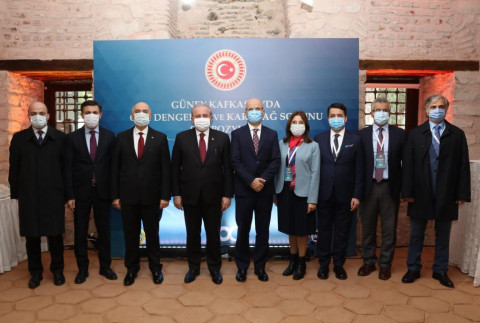Hosted by the Turkish Grand National Assembly and organized with the cooperation of Marmara University and Istanbul University, the “Symposium on Power Balances and the Karabakh Conflict in the South Caucasus" was held at the Topkapı Palace Museum Conference Hall.
Prof. Dr. Erol Özvar, Rector of Marmara University, said in the opening of the symposium that while some of the people of the same nation passed to Anatolia during historical migrations, some of them stayed in the Caucasus. Reminding the words of the former President of Azerbaijan Heydar Aliyev, "One nation and two states", Özvar continued by saying that "The Caucasus and Central Asia started in the 19th century with great destruction, massacre and occupation in terms of Turkish geography, and this situation did not change until the last 10 years of the 20th century after the Bolshevik revolution. During the Soviet Union, on the one hand, the Stalinist regime forced the Turks of Azerbaijan to deport to make a regional organization for Armenians in Nagorno-Karabakh belonging to the Turks, and on the other hand, it encouraged many Armenians to settle in the region. This policy of the Russians resulted in war in the 1990s. "
Explaining that the Armenians occupied the lands of Azerbaijan and committed many massacres, Özvar also pointed to the support of Turkey in the final battle that resulted in the victory of Azerbaijan. He said that Turkey's attitude on Karabakh was effective in the formation of the viewpoint of, particularly countries in the region, other countries interested in the subject matter and with the great support of Turkey, Azerbaijan saved its lands in Karabakh, which has been occupied by Armenia for nearly 30 years, by giving 2 thousand 783 martyrs in the war that lasted for 44 days.
Expressing that their universities are ready to provide all kinds of support to Azerbaijan, Özvar stated that they are ready to initiate studies for the establishment of a new university in Azerbaijan under the leadership of Marmara University.
Istanbul University Rector Prof. Dr. Mahmut Ak, the other speaker of the symposium, said that Karabakh, which has a strategic location between the Black Sea and the Caspian Sea, is ancient Turkish land belonging to Azerbaijan and added “Against the pressure of the Armenians against the Karabakh Turks, a massacre was prevented in the region thanks to the military operation launched by the Turkish army in September 1918. However, the Turkish army had to withdraw from the region after the signing of the Mondros Armistice Agreement. Because of the reign of Soviet Russia in the region, Karabakh was restructured as a Nagorno-Karabakh Autonomous Region, on the condition of being affiliated with the Azerbaijan Soviet Socialist Republic. The efforts of the Armenians to turn the region into chaos turned into a conflict between 1987-1991. Most of the Turks in the region were forced to migrate to Azerbaijani lands. Eventually, the events turned into a human tragedy and a war crime. Armenian armed forces carried out a massacre in the city of Khojaly on the night of 25 February 1992. They killed people by burning them in their homes. After this unprecedented massacre, Armenia started the invasion of Karabakh and completely evacuated the Turkish population in the region”.
Parliament Speaker Mustafa Şentop pointed out that the Karabakh issue has been an ongoing problem for 30 years, but this problem could not be solved by the Minsk group. He added in his words: "In fact, does not solve this problem mean that the problem cannot be solved? Or does it mean that there is actually no intention to solve it? It is possible and necessary to pose this question”.
The topics of the symposium that will end tomorrow are as follows: "Nakhchivan Corridor in Historical Perspective", "Global Geopolitics and Turkey", "New Perspectives in Turkish Foreign Policy", " The Effects of Armenian Historical Grudge and Hate Speech on Southern Caucasus Politics ", " The Perspective of the Turkic Republics and Iran on the Karabakh Problem "," How to Read Russia's Nagorno-Karabakh Attitude "," A Potential Threat in the South Caucasus: Could Cevaheti Become a Second Nagorno-Karabakh?”.




